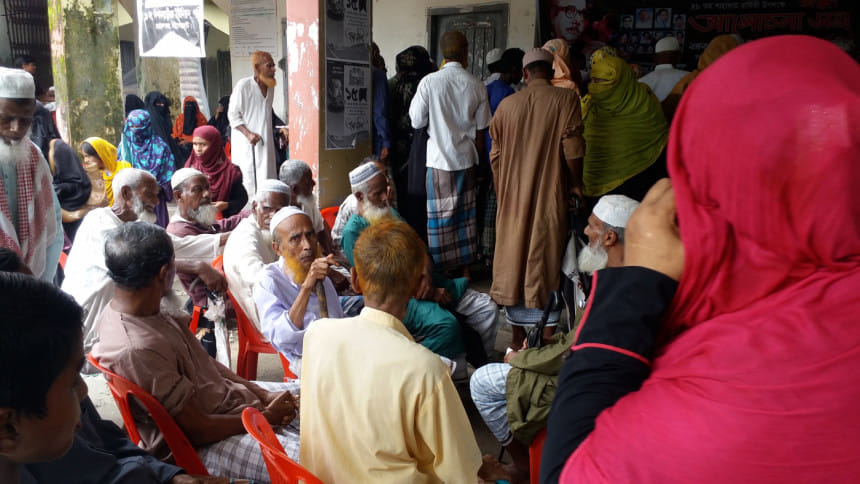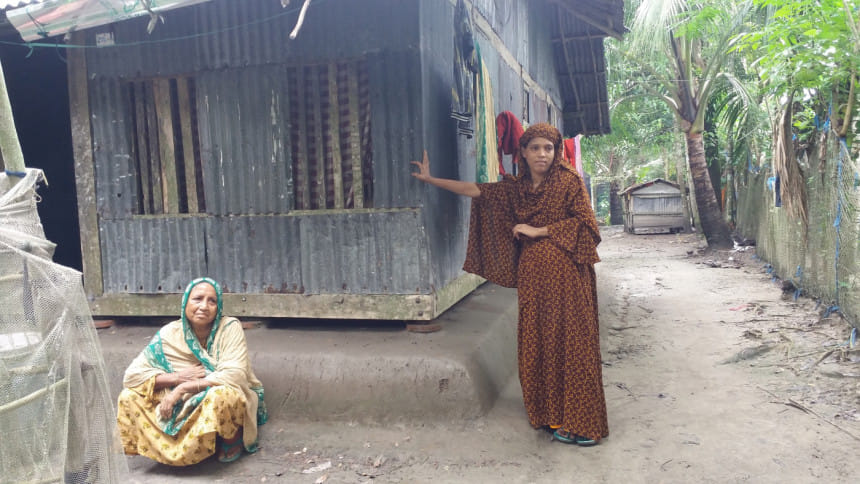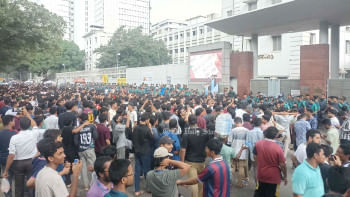Families trapped in saline water

A silent health crisis is unfolding in Gulishakhali village in Bagerhat's Morrelganj upazila. Take the case of Putul Akhter, a 32-year-old resident who, along with her family, is grappling with a myriad of health complications, including diabetes, kidney, liver and skin-related issues. Doctors attribute these ailments to the persistent use of saline water for bathing and consumption.
"I consulted doctors multiple times in the last two years. They told me the diseases have developed due to bathing and consuming saline water, and I would not get well if I don't stop using saline water," she said.
Putul lives with her mother-in-law and two children in a small house on the bank of Bhola river, adjacent to the Sundarbans, while her husband lives in Dhaka for work.
"Due to poverty, we are unable to relocate, away from saline water. We don't know how we will survive in this way," she said.

Putul's mother-in-law Shefali Begum has also been suffering from skin and bone diseases for a long time. Their stories are emblematic of a larger problem affecting thousands in Bagerhat's Sadar, Morrelganj, Sharankhola, Mongla, and Rampal upazilas.
This correspondent, after speaking to more than 50 villagers, found a similar pattern of health concerns plaguing the community. The root cause lies in the relentless intrusion of saline water, a consequence of factors such as sea level rise and geographical vulnerability.
"It seems we are living in a salt mine. We have to drink and use saline water all year round except in the monsoon. That is why we are always ill with complications including diarrhoea, dysentery, hypertension, and skin diseases," said Piara Begum of Gulishakhali.
Sakina Begum of Baruikhali village echoed her.
Amzad Hossain, 85, of Guatla village, said,"Around 50 years ago, we could use water of Baleshwar river. Later, salt water of nearby Pashur river gradually started to intrude into the Baleshwar," said Amzad Hossain, 85, of Guatla village.
Dredging of Pashur and Bhola rivers resulted in reduction in the rivers' current, which in turn increased the water's salinity, further deteriorating the situation, said locals.
Meanwhile, local hospitals and clinics have been witnessing a considerable increase in number of patients.
Azizur Rahman, a community health care provider in Badsharhat under Morrelganj upazila, said he provides treatment to around 900 patients monthly, most of them suffering from different diseases caused by saline water.
Over 300 people come to Bagerhat 250-Bed District Hospital daily said hospital sources.
"These diseases can be avoided if the people drink and use water free from salinity," said Dr Asim Kumar Samadder, superintendent of the hospital.
PROFITING OUT OF A HEALTH CRISIS
The Department of Public Health Engineering and different NGOs are working to provide safe, non-saline water among the people in this region through harvesting rainwater, digging ponds, and installing Pond Sand Filter (PSF).
However, some people's representatives and influential persons have been asking for Tk 3,000 to Tk 5,000 as bribes from each family to provide the facility, alleged residents of Gulishakhali and neighbouring villages.
"We could not get water tanks for harvesting rainwater, as we could not pay the money. We are poor. How will we arrange the money?" said a female resident of Gulishakhali.
None of them, however, wanted to disclose names of the persons demanding bribes from them.
As per government rule, each beneficiary must pay Tk 1,500 to get a water tank, Jayanta Mallick, executive engineer of DPHE in Bagerhat.
"Usually, peoples' representatives of different local union parishads prepare lists of beneficiaries. We don't know anything about asking for bribes. If anyone files a complaint, we will take necessary legal action upon investigation," he added.

 For all latest news, follow The Daily Star's Google News channel.
For all latest news, follow The Daily Star's Google News channel. 



Comments